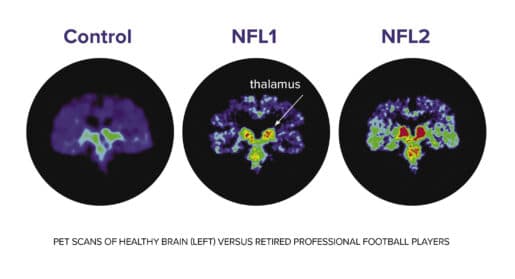Fact checked by Jim Lacy
Endeavor Health is leading a groundbreaking clinical trial aimed at diagnosing chronic traumatic encephalopathy (CTE) — a form of progressive brain trauma — in living patients.
Repeated head injuries can cause the neurodegenerative disease CTE. It commonly affects contact-sport athletes and military personnel exposed to blasts.
Despite its severity, physicians currently can only diagnose CTE after death through autopsy. “If you can’t identify it while somebody’s alive, obviously you can’t help them,” says Julian Bailes, MD, chair of neurosurgery at Endeavor Health Neurosciences Institute.
The national trial, conducted at nine sites, will compare 90 people with a history of multiple head impacts or traumatic brain injuries with 90 people experiencing Alzheimer’s disease symptoms. Researchers will use positron emission tomography (PET) scans and an intravenous substance that binds to tau and amyloid proteins — markers of brain degeneration.
“These [markers] are typically seen in various forms of brain degeneration, but there appears to be a characteristic picture that identifies CTE as opposed to other forms of dementia, like Alzheimer’s disease,” Bailes says.
In addition to helping patients manage symptoms earlier, Bailes hopes a diagnostic tool for CTE in living patients will not only help patients manage symptoms but can also motivate the pharmaceutical industry to pursue targeted treatments.

Originally published in the Fall 2025/Winter 2026 print issue.

Anushree (Anu) Vashist is a freelance writer who often covers medicine, science, and higher education. She recently graduated from the University of Chicago with a double major in biological sciences and history.











